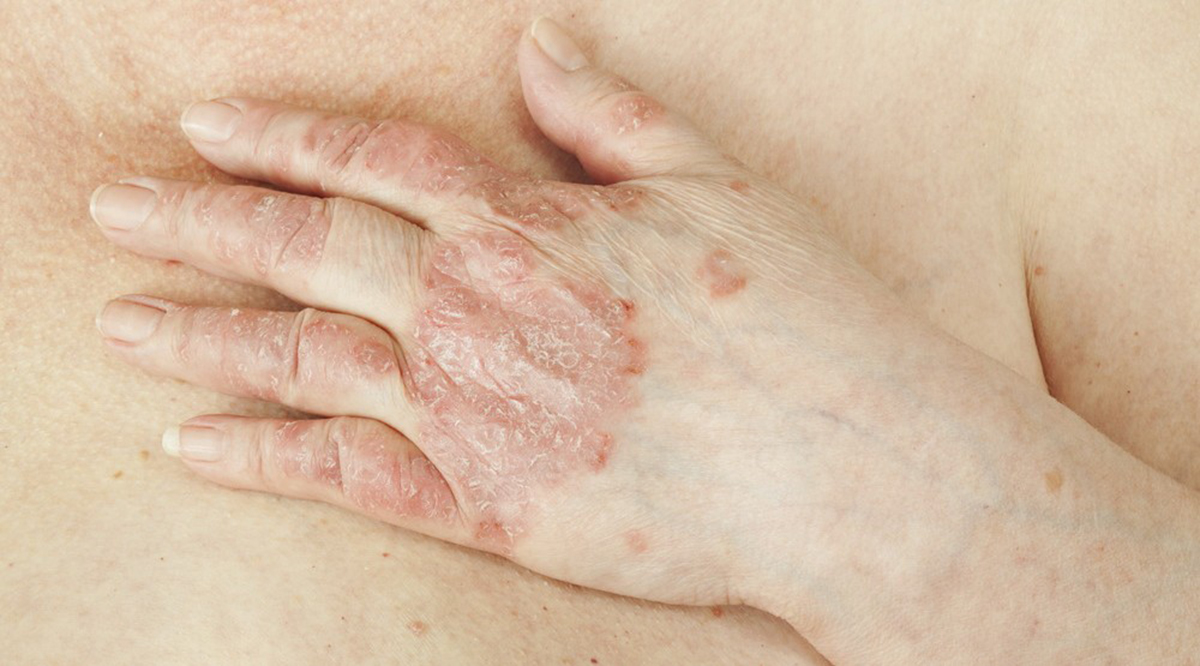Table of Contents
Psoriasis, a chronic inflammatory disease that affects approximately 2-4% of the population has been linked to other serious conditions affecting not only the skin, but other organs and systems in the body. Clinically, psoriasis presents itself as red plaques or patches on the skin with silver or white scales. These skin lesions can occur anywhere on the body and can be itchy or painful. The redness is due to the dilation of blood vessels and the scales are caused by layers of rapidly turned over skin cells. The pathophysiology of psoriasis is a complex process that involves the immune system and skin cells. Researchers have been unable to identify a singular cause for psoriasis, but studies suggest that there are multiple genetic factors that affect the cells of the immune system that subsequently adversely affect the skin. Approximately one third of people with a family history of psoriasis will develop this condition, and there is an increased incidence in both identical and fraternal twins.

Psoriasis symptoms are caused by dysregulation of immune system
Dysregulation of the immune system has an adverse effect on the function of the cells in the immune system. One type of cell that is affected is the T-cell.
Typically, new skin cells take weeks to renew, but in the case of psoriasis, this process takes just days. This causes the build-up of dead skin cells that, in turns, results in the development of the scale.
Other factors affected by the dysregulation of the immune system include the cytokines. One cytokine in particular, called tumor necrosis factor (TNF) has been studied extensively. TNF has been found to play a significant role in the pathophysiology of psoriasis and, as a result, medications have been developed to treat psoriasis that specifically target the TNF.
Genetic factors are linked to the development of psoriasis
See Also: The Ten Most Common Psoriasis Triggers
They have determined that for a person to develop psoriasis there needs to be a combination of the genes and exposure to one or more external triggers. These include stress, some types of medications, infection, and skin injury. Finding the genes responsible has been challenging. Studies of the pathogenesis of psoriasis continue to find new genetic links and mutations that may cause this skin disease. There has been a recent development made by a group of researchers from the Washington University School of Medicine in St. Louis, who have studied the gene CARD14. This gene is directly linked to the plaque psoriasis, the most common form of psoriasis affecting 80% of people with this disease. CARD14 is a gene that encodes a protein that links with other proteins forming molecular scaffold for assembly of various cellular multi-protein complexes. This study has found that CARD14 mutations may also play a role in other forms of psoriasis. This discovery and others like it could lead to more targeted therapies for this disease.
- Cohen AD, Harel G, Henkin Y, et al. Psoriasis and the Metabolic Syndrome. Acta Dermato-Venereologica. 2007 Oct, 87(6): 506-509
- Zindanci I, Albayrak O, Kavala M, et al. Prevalence of Metabolic Syndrome n Patients with Psoriasis. Scientific World J. 2012, 2012: 312463
- Qureshi AA, Choi HK, Setty AR, Curhan GC. Psoriasis and the Risk of Diabetes and Hypertension A Prospective Study of US Female Nurses. Arch Dermatol 2009, 145(4): 379-382
- Wakkee M, Thio HB, Prens EP, Sijbrands EJ, Neumann HA. Unfavorable cardiovascular risk profiles in untreated and treated psoriasis patients. Atherosclerosis. 2007 Jan, 190(1): 1-9
- Lin SW, Chambers CJ, Sockolov ME, Chin DL. Psoriasis and Hypertension Severity: Results from a Case-Control Study. PLOS One. 2011 Mar 29. DOI: 10.1371/journal.pone.0018227
- Wu S, Han J, Li WQ, Qureshi AA. Hypertension, Antihypertensive Medication Use, and Risk of Psoriasis. JAMA Dermatol. 2014 Jul 2.
- Photo by shutterstock.com
- Photo courtesy of Trevor Butcher by Flickr : www.flickr.com/photos/27888428@N00/2812905881


Your thoughts on this